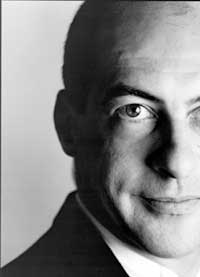The Return
of Spano
Robert Spano '84 Returns to Conduct Manon
by Linda Shockley
Photo by Michael Darter
 Robert
Spano, associate professor of conducting and music director
for the Brooklyn Philharmonic, is a top talent in a highly
competitive industry. Often the focus of front page Arts
& Leisure section coverage in The
New York Times, Spano has received critical acclaim
for his work with leading orchestras throughout the world,
where he has proven himself as adept at conducting well-known
and beloved classics, as he is in conducting world premieres
of contemporary works. Spano describes his role as music
director this way: "The primary function of a music director
is to be the artistic conscience of an institution, as
well as being the public face of the institution: a kind
of ambassador."
Robert
Spano, associate professor of conducting and music director
for the Brooklyn Philharmonic, is a top talent in a highly
competitive industry. Often the focus of front page Arts
& Leisure section coverage in The
New York Times, Spano has received critical acclaim
for his work with leading orchestras throughout the world,
where he has proven himself as adept at conducting well-known
and beloved classics, as he is in conducting world premieres
of contemporary works. Spano describes his role as music
director this way: "The primary function of a music director
is to be the artistic conscience of an institution, as
well as being the public face of the institution: a kind
of ambassador."
Establishing a relationship is primarily about listening. When approaching either singers or an orchestra, my first interest is to focus on what they are doing. While singers clearly have distinct personalities, so do orchestras. So it becomes a matter of responding to what I hear. One of the reasons I became a conductor is that I love collaborating. Working with musicians all the time keeps me more informed. There is great reward in incorporating other peoples' ideas into my own music making.
You have received much well-deserved recognition for your talent in interpreting a broad variety of music. What are the challenges for young musicians with a yen for contemporary and new music? Does contemporary and new music - the less traditional repertoire - introduce its own set of demands
Contemporary music is changing so fast. There was a time when new music was a kind of ghetto - maybe that's too pejorative a word - but it was relegated to special series, performed by special groups. Now the contemporary music scene is opening up. Interestingly, this wider acceptance is concurrent with a tremendous variety in the music being written. Much of it has a strong and popular appeal. For instance, I'm conducting world premieres of commissioned pieces with the Houston Symphony and with the Boston Symphony in regular series concerts. Of course that's nothing new in the world, but there does seem to be increased new music activity.
The challenge of doing new music is primarily the capacity to constantly expand one's vocabulary. The approach is essentially the same as with old music, which is to understand the composers' voice, circumstances, environment, aesthetic. When approaching Mozart, we try to be in touch with the musical sources that created his voice: his study of J.S. Bach, his friendship with the Baron Gottfried van Swieten, his involvement with free masonry, and Viennese culture in the 18th century.
When I was teaching at Oberlin on a more full-time basis, I had a bulletin board outside of my office where I would often place quotations on the board. Every year, quotations from Robert Schumann's "On Music and Musicians" would surface. Of particular note were his "House Rules and Maxims for Young Musicians." I don't think anyone can improve upon his clarity and truths, so I'll pass along a few of my favorites:
Nothing worthwhile can be accomplished in artwithout enthusiasm.Art was not created as a way to riches. Strive to become a true artist; all else will take care of itself.There is no end to learning.You will steadily progess through industry
perserverance.
Seek out among your comrades those who know
more than you do.
